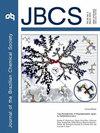Parallel-DPX-Cork原位衍生肺癌生物标志物醛,HPLC-DAD定量
IF 1.3
4区 化学
Q3 CHEMISTRY, MULTIDISCIPLINARY
引用次数: 0
摘要
肺癌是全世界每年成千上万人死亡的主要原因之一。生物标记醛,如己醛和庚醛,是与肺癌发展有关的化合物,可以在肺癌的早期阶段检测到。提出了一种方法来确定这些醛在尿液中,与一个新的配置相关的样品制备步骤。采用平行一次性移液管提取(DPX)-软木装置的新策略,提供了一种快速且经济实惠的提取方法,并使用二极管阵列检测器进行高效液相色谱分析。在优化步骤中,采用多因素和单因素设计,提供以下条件:尿样在3500 rpm离心15 min,二硝基苯肼浸渍30 μL和6 min, 10倍尿液在超纯水中稀释,pH调整为4.8,7次提取,每次1.5 min, 30 mg的cork, 2次解吸,溶剂乙腈300 μL。两种分析物的检出限分别为0.13 ng mL-1,己醛和庚醛的定量限分别为0.40和0.41 ng mL-1。日内及日间精确度介乎4%至21%。在三种浓度下,相对回收率为86% ~ 107%。对尿样进行了分析,但没有检测到醛类物质的存在。本文章由计算机程序翻译,如有差异,请以英文原文为准。
In situ Derivatization of Lung Cancer Biomarker Aldehydes by Parallel-DPX-Cork and Quantification by HPLC-DAD
Lung cancer is one of the main causes of death for thousands of people yearly around the world. Biomarker aldehydes, such as hexanal and heptanal, are compounds related to the development of lung cancer, which can be detected in the early stages of this disease. A methodology was proposed to determine these aldehydes in urine, with a new configuration associated with the sample preparation step. A novel strategy with a parallel-disposable pipette extraction (DPX)-cork device was used, offering a fast and affordable extraction methodology with analysis performed by high performance liquid chromatography with diode array detector. In optimization steps, multivariate and univariate designs were applied, providing the following conditions: urine sample centrifuged at 3500 rpm for 15 min, 30 μL and 6 min of dinitrophenylhydrazine impregnation, 10× urine diluted in ultrapure water, pH adjusted to 4.8, 7 extraction cycles with 1.5 min each, 30 mg of cork, 2 desorption cycles and solvent acetonitrile with 300 μL. Limits of detection were 0.13 ng mL-1 for both analytes and limits of quantification were 0.40 and 0.41 ng mL-1 for hexanal and heptanal, respectively. Intraday and interday precisions ranged from 4 to 21%. Relative recoveries ranged from 86 to 107%, assessed at three concentrations. Urine samples were analyzed, but the presence of aldehydes was not detected.
求助全文
通过发布文献求助,成功后即可免费获取论文全文。
去求助
来源期刊
CiteScore
2.90
自引率
7.10%
发文量
99
审稿时长
3.4 months
期刊介绍:
The Journal of the Brazilian Chemical Society embraces all aspects of chemistry except education, philosophy and history of chemistry. It is a medium for reporting selected original and significant contributions to new chemical knowledge.

 求助内容:
求助内容: 应助结果提醒方式:
应助结果提醒方式:


